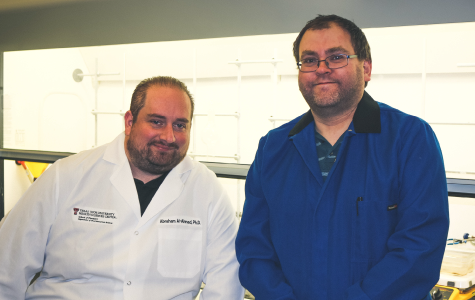Amarillo researchers identify promising compounds to treat neurodegenerative diseases

Abraham Al-Ahmad and Paul Trippier
A study published in the November issue of the Journal of Medicinal Chemistry, the nation’s leading medicinal chemistry journal, describes new compounds designed and synthetized in the lab of Paul Trippier, Ph.D., that show the effects of protecting human neurons in a dish from a form of cell death common in neurodegenerative diseases such as Alzheimer’s disease and Parkinson’s disease.
Trippier is an assistant professor for the Department of Pharmaceutical Sciences at the Texas Tech University Health Sciences Center (TTUHSC) School of Pharmacy in Amarillo. He is collaborating with the lab of Abraham Al-Ahmad, an assistant professor in the same TTUHSC School of Pharmacy department.
Trippier said the TTUHSC research team grew functional human neurons from stem cells and then treated them with the synthesized compounds. When cell death was induced, many more neurons that had been treated with the new compounds survived than did those that were not treated.
“These compounds are in the early stages of drug discovery, but they show promise for the treatment of many different types of neurodegenerative disease,” Trippier said. “The advantage to this study is the use of stem cell-derived functional human neurons. Many studies have identified compounds that can protect either neuron-like cells or mouse neurons, but they rarely carry forward to show effect in humans.”
As the compounds developed in his and Al-Alamad’s labs already show effect in human neurons, Trippier said they are much more likely to be effective in patients, albeit in the distant future.
Related Stories
How Does Your Garden Grow?
As spring approaches, some people’s thoughts turn to gardening. Whether it’s a flower garden they desire or a vegetable garden want to have, they begin planning what they’ll plant and what they need to do to ensure a successful garden.
Adopt a Growth Mindset for a Better Life
A “growth mindset” accepts that our intelligence and talents can develop over time, and a person with that mindset understands that intelligence and talents can improve through effort and learning.
Drug Use, Family History Can Lead to Heart Disease in Younger Adults
Abstaining from drug abuse and an early diagnosis of familial hypercholesterolemia (high cholesterol) can help prevent heart disease.
Recent Stories
The TTUHSC Laura W. Bush Institute for Women’s Health Welcomes Ben Carson as Power of the Purse Keynote Speaker
Retired neurosurgeon and former U.S. Secretary of Housing and Urban Development Ben Carson, M.D., delivered a keynote address at the Power of the Purse luncheon and fundraiser today (April 18).
Filling the Gap: PA Impact on Rural Health Care
Assistant Professor and Director of Clinical Education Elesea Villegas, MPAS, PA-C, spoke about the challenges rural health care currently faces and how PAs are stepping up to better serve the rural patient population.
School of Pharmacy Remembers Contributions of Key Collaborator
Cynthia Nash, Pharm.D., served as an Adjunct Assistant Professor of Pharmacy Practice for the School, and was an instrumental collaborator and key ally in our partnership with the Dallas VA North Texas Health Care System.
